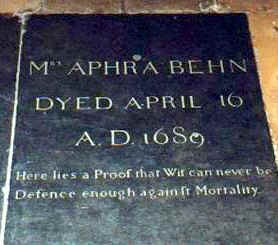Reading Aphra Behn’s "The Rover" in context
 "Lead on, no other Dangers they can dread,
"Lead on, no other Dangers they can dread,Who venture in the Storms o’th’ Marriage–Bed."
~Willmore, Act V
On to Behn… I very much enjoyed Elaine Hobby’s article “No Stolen Object, but Her Own: Aphra Behn’s Rover and Thomas Killigrew’s Thomaso.” As with Marta Straznicky’s article about Cavendish and closet drama, I thought that putting the play in its historical context was extremely helpful. Hobby calls “for less speculation on our part, and a return—if armed with modern political and theoretical questions—to an old-fashioned business: we need to read more texts with greater attention” (Hobby 113-114). I’m a big believer in new historicism and the close reading, so I appreciated this approach.
Reviewing some major misconceptions about Behn—i.e., that she was a female libertine—Hobby goes back to Behn’s own comments about her work, in which Behn issues “a challenge to any person of common sense and reason” to read any of her comedies “and compare ’em with others of this age” (Hobby 114). She then proceeds to do just this, examining the changes Behn made from Killigrew’s original material to create The Rover.
To begin with, Hobby points to the fact that The Rover, unlike Killigrew’s version, begins with women's voices, two sisters “teasingly exploring together how they might take control of their own sexual fates” (118). The connection and cooperation between women is key, and sets Behn apart from previous portrayals of women as catty, petty, and divided against each other (as we saw in the anonymous play The Female Wits). Unlike in Killigrew’s original story, it is Valeria, a quick-thinking woman, who saves Florinda from gang rape. Rather than being indebted to her lover Belvile, it is a female rescuer to which Florinda turns, saying, “My dear preserver, let me embrace thee” (Act V, Scene I).
Hobby points to a second major departure Behn makes from Killigrew: the motivations of the courtesan Angellica Bianca. She is not, as in Killigrew, insatiable female sexuality personified. Rather, she decides to sell herself out of economic necessity—precisely what men do when they marry for financial gain, as she argues in Act II, Scene II:
Pray, tell me, Sir, are not you guilty of the same mercenary Crime? When a Lady is proposed to you for a Wife, you never ask, how fair, discreet, or virtuous she is; but what’s her Fortune—which if but small, you cry—She will not do my business—and basely leave her, tho she languish for you.—Say, is not this as poor?
The dichotomy of female nature as exclusively virtuous or whorish is called into question, and Angellica becomes “a symbol of a common female fate” (Hobby 119), driven by circumstances and not innate qualities. Moreover, unlike Killigrew’s courtesan, Angellica hopes for fidelity from the man she gives herself to, lamenting, “My virgin heart, Moretta! Oh ’tis gone!” (Act IV, Scene II) when her hope is dashed. Hardly the picture of female libertinism.
Behn makes a series of connections between Hellena and Angellica throughout The Rover which further blur the absolute distinction between virgin and whore. The two start as the same woman, a woman who merely meets different fates. Willmore, for instance, is interested in bedding both Hellena and Angellica, but is only interested in wedding Hellena after finding out about her fortune. In the world as Behn portrays it, any man could turn rapist, and any woman become a whore, and those who rely on "gentlemanly respect for a lady's virtue" are "dangerously foolish" (Hobby 122). The definitions of feminity available in Behn's world are indeed "all bad news for women" (Hobby 114).
 Now for a little homage to Behn from Virginia Woolf’s A Room of One’s Own (1929):
Now for a little homage to Behn from Virginia Woolf’s A Room of One’s Own (1929):“All women together ought to let flowers fall upon the tomb of Aphra Behn… for it was she who earned them the right to speak their minds.”

1 Comments:
Yes, I too find Hobby persuasive when she argues that Behn is undermining the virgin/whore categories.
Post a Comment
<< Home